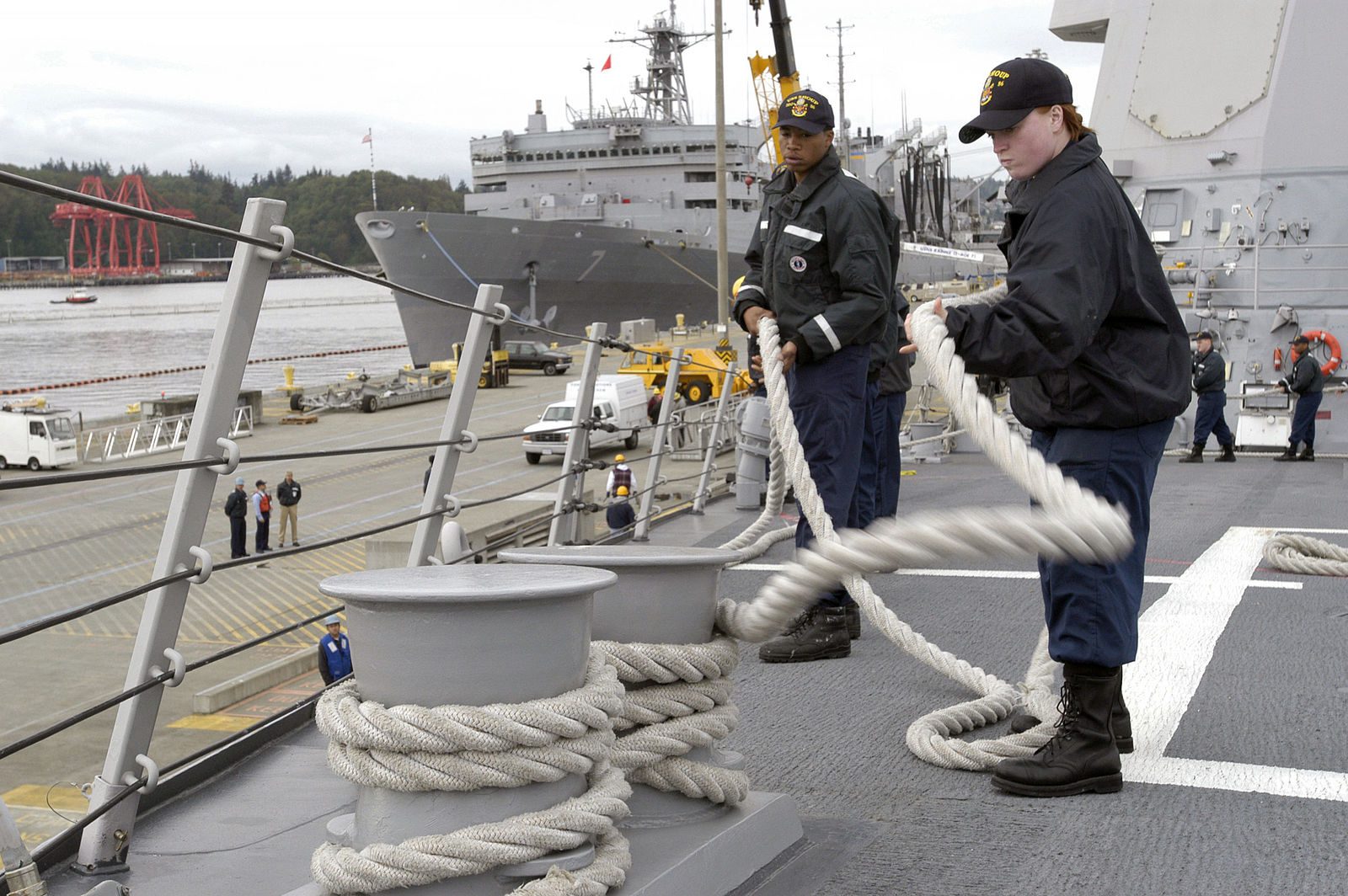Hung Cao – A Navy Diver In The Pentagon Briefing Room
Hung Cao and the Fight to Rebuild America’s Maritime Power Before the Next War Arrives by Captain John Konrad (gCaptain) The first thing you notice about the US Navy’s Undersecretary...

Boatswain’s Mate 3rd Class Crystal Thompson takes the number two mooring line off the bits in preparation for getting underway aboard the guided missile destroyer USS Shoup (DDG 86). U.S. Navy photo by Eli J. Medellin.
by Phil Stewart (Reuters) – The United States is considering sending a warship through the Taiwan Strait, U.S. officials say, in a move that could provoke a sharp reaction from Beijing at a time when Sino-U.S. ties are under pressure from trade disputes and the North Korean nuclear crisis.
A U.S. warship passage, should it happen, could be seen in Taiwan as a fresh sign of support by President Donald Trump after a series of Chinese military drills around the self-ruled island. China claims Taiwan as part of its territory.
U.S. officials told Reuters that the United States had already examined plans for an aircraft carrier passage once this year but ultimately did not pursue them, perhaps because of concerns about upsetting China.
The last time a U.S. aircraft carrier transited the Taiwan Strait was in 2007, during the administration of George W. Bush, and some U.S. military officials believe a carrier transit is overdue.
Another, less provocative option would be resuming the periodic, but still infrequent, passages by other U.S. Navy ships through the Strait, the last of which was in July 2017.
The Pentagon declined comment on any potential future operations and it was unclear how soon a passage might take place.
Speaking in Beijing, Chinese Foreign Ministry spokeswoman Hua Chunying urged the United States to prudently handle the Taiwan issue so as to avoid harming bilateral ties and peace and stability in the Taiwan Strait region.
“We have repeatedly emphasized that the Taiwan issue is the most important and sensitive core issue in the China-U.S. relationship,” she told a daily news briefing on Tuesday.
Taiwan’s Defense Ministry declined to comment, saying the news had yet to be verified.
Trump, who broke protocol as president-elect by taking a phone call from Taiwan’s president in 2016, has toned down his rhetoric about Taiwan in recent months as he seeks China’s aid in the nuclear standoff with North Korea.
The United States and China are also trying to find their way out of a major trade dispute that has seen the world’s two economic heavyweights threaten tit-for-tat tariffs on goods worth up to $150 billion each.
China has alarmed Taiwan by ramping up military exercises this year, including flying bombers and other military aircraft around the island and sending its carrier through the narrow Taiwan Strait separating it from Taiwan.
“They’re turning up the heat,” a fourth U.S. official said, speaking on condition of anonymity to describe the U.S. view of Chinese activities around Taiwan.
Separately, it now appears unlikely the United States will send top officials to a June 12 dedication ceremony for the new American Institute in Taiwan, America’s de facto embassy in Taiwan. Washington does not have formal ties with Taipei.
U.S. officials told Reuters that the date clashes with the planned June 12 summit between Trump and North Korean leader Kim Jong Un, but added there will be another opportunity to commemorate the institute’s unveiling in September.
Since taking office, Trump has approved a $1.4 billion arms sale to Taiwan and angered Beijing by signing legislation encouraging visits by senior U.S. officials to Taiwan. Trump also named John Bolton, known as a strong Taiwan supporter, as his national security adviser.
The fourth U.S. official told Reuters Washington aimed to change the way it approaches arms sales requests from Taiwan to address them on a case-by-case basis, as opposed to bundling them together.
Rupert Hammond-Chambers at the U.S.-Taiwan Business Council trade association said moving away from bundling – a practice in place for a decade – would be better for Taipei’s defense needs, treating it more like a regular security partner.
“We get into difficulty when we treat Taiwan differently, which opens the door for the politicization of the (arms sales) process,” Hammond-Chambers said.
Military experts say the balance of power between Taiwan and China has shifted decisively in China’s favor in recent years, and China could easily overwhelm the island unless U.S. forces came quickly to Taiwan’s aid.
The United States is bound by law to provide Taiwan with the means to defend itself, but it is unclear whether Washington would want to be dragged into war with China over the island.
Asked about U.S. obligations to Taiwan, Pentagon spokesman Lieutenant Colonel Christopher Logan noted Washington has sold Taiwan more than $15 billion in weaponry since 2010.
“We have a vital interest in upholding the current rules-based international order, which features a strong, prosperous, and democratic Taiwan,” Logan said.
Reporting by Phil Stewart and Idrees Ali in Washington; Additional reporting by John Walcott in Washington, Jess Macy Yu in Taipei and Philip Wen in Beijing; Editing by Mary Milliken and James Dalgleish

Sign up for gCaptain’s newsletter and never miss an update

Subscribe to gCaptain Daily and stay informed with the latest global maritime and offshore news
Essential news coupled with the finest maritime content sourced from across the globe.
Sign Up